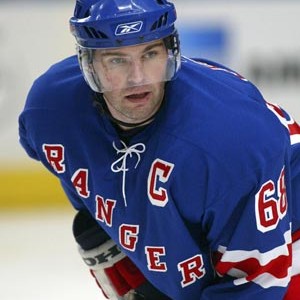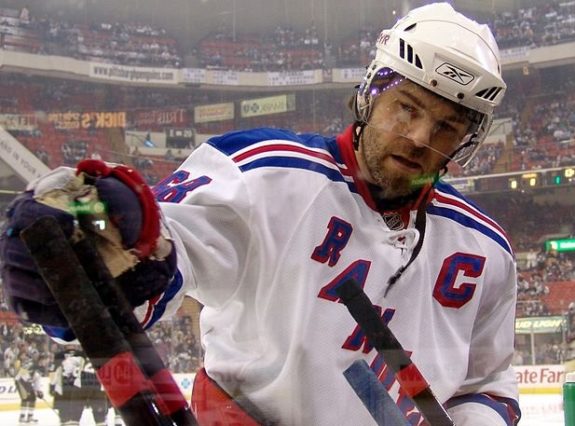Introducing The Hockey Writers’ Countdown to Puck Drop series. From now until the puck drops on the 2019-20 NHL’s regular season on Oct. 2 when the Toronto Maple Leafs host the Ottawa Senators, we’ll be producing content that’s connected to the number of days remaining on that particular day. Some posts may be associated with a player’s number, while others will be connected to a year or length of time. We’re really excited about this series as we take you through the remainder of summer in anticipation of the return of NHL hockey.

With 68 days left in the NHL season, let’s take a look back to Jan. 23, 2004, when The New York Rangers acquired forward, Jaromir Jagr, from the Washington Capitals in exchange for Anson Carter.
Jagr would play 31 games for the Rangers in the second half of the 2003-04 season. Adjusting to a new team seemed to come naturally to the turning 32-year-old as he came close to a point-per-game with 29 points in 31 games. If this season was anything, it would be a foreshadow of what the superstar could bring to New York next season.
2005-06: Rangers Records Rewritten
The season following the lockout, 2005-06, would be Jagr’s most productive season while wearing a Rangers jersey. In his first full season with the Rangers, he notched an incredible 123 points, including 54 goals (with 24 on the power-play), and 69 assists, while playing in all 82 games. Jagr broke multiple New York Rangers single-season scoring records, passing Adam Graves’ 53 goals in the 1993-94 season and Jean Rattelle’s 109 points in the 1971-72 season. He also passed Vic Hadfield, who had 23 power-play goals in the 1971-72 season.
Jagr was one week shy of winning both the Art Ross and Maurice Richard Trophies. Joe Thorton, who started the season with the Boston Bruins and finished with the San Jose Sharks, totaled 125 points, two more than Jagr. Sharks’ teammate, Jonathan Cheechoo, had 56 goals at the end of the season, once again two more than the Czechoslovakian native. Jagr would take home some hardware, however, as he was awarded his third Lester B. Pearson Award for Most Valuable Player voted on by his peers across the league. Behind Jagr in points for the 2005-06 season was Michael Nylander, who tallied 79 points, 44 points behind the Rangers’ star.

Led by Jagr, the Rangers made the playoffs for the first time since the 1996-97 season. The team, coached by Tom Renney, finished the season with a 44-26-12 record equaling 100 points, good for third in the Atlantic Division. In playoffs, the team ultimately lost four games straight to the New Jersey Devils in the Conference-Quarter Finals ending their season. Jagr struggled in the playoffs as he suffered a shoulder injury late in Game 1. He sat out Game 2 and returned to the series for Game 3, but was mostly ineffective. Less than a minute into Game 4 of the Devils’ barrage, Jagr was bitten once again by the injury-bug. He needed surgery following their playoff exit.
Before the beginning of this season, the media predicted this Rangers team would scrape the bottom of the standings. Even though the Rangers didn’t go far in the playoffs, they still put up a great regular season and more importantly, got a taste of what competing for the Stanley Cup was all about.
2006-07: The Passing of the Rangers Captaincy
This Rangers group, who hadn’t seen much success in past years, had been resurrected following the 2005-06 season, but still were in search of a captain. The organization seemed hesitant on deciding to name a new one, an existing problem currently. Mark Messier was their most recent and arguably, most famous captain. After finishing his career with New York in the 2003-04 season, where Jagr and Messier were teammates for a brief time, the Rangers were left in desolation.

Loved by all and given the famous nickname, “the Captain”, Messier was a hero in this city, especially after the 1994 Stanley Cup Championship. With Messier’s retirement and the firesale of aging veterans, the future of the Rangers looked like a sinking ship, destined for the bottom of the standings. Following the 2004-05 season lockout, Jagr grabbed the ship’s wheel and steered the sinking vessel to calmer waters where he taught the team how to be winners.
Finding a successor to honor the “C” would take some time, two years, in fact. The first being the lockout year and the second was the 2005-06 season which saw three assistant captains, Jagr, Steve Rucchin and Darius Kasparaitis. In 2006, Jagr was named the team’s 24th captain in franchise history. In the opening game of the 2006-07 season, he scored his first goal as a Rangers captain, 30 seconds into the season, against his former team, the Capitals. Jagr finished the season with 96 points, including 30 goals and 66 assists, once again playing in all 82 games.
The 2006-07 season saw the Rangers’ newly anointed captain reach multiple NHL milestones, including his 600th goal, 1,500th point, and a record of 15 consecutive seasons of 30 or more goals, tying the NHL record held by Rangers alumni, Mike Gartner.
The Blueshirts had more playoff success this time around, as they swept the Atlanta Thrashers in the Conference Quarterfinals, but would see their hopes of raising the Stanley cup dwindle when they lost to the Buffalo Sabres in game six of the Conference Semifinals.
2007-2008: Jagr’s Final Season in New York
Serving as captain for the second season, Jagr didn’t see the same numbers he had in prior years. This season was his worst in regards to points. He recorded 25 goals and 46 assists for a total of 71 points in 82 games. This marked his third consecutive season playing in all 82 games for the Rangers. Jagr still had good numbers, but for a player of his caliber, it wasn’t enough.

Jagr found success in the 2008 Playoffs. In 10 games, Jagr scored five goals and 10 assists for 15 points. The Rangers beat the New Jersey Devils in a 4-1 series, but once again lost in the Conference Semifinals to another one of Jagr’s former teams, the Pittsburgh Penguins. Even with this success, Jagr left for the KHL in the offseason where he played for next three seasons with Avangard Omsk in the KHL, the team he played with during the 2004-05 lockout.
It is undeniable how important Jagr was to this Rangers’ group. Upon arriving in New York, Jagr’s leadership and professionalism couldn’t be left unnoticed. In the three years with Jagr at the helm, the team made the playoffs. He helped create a winning culture the organization could teach to younger players who are anxious to break into the league. This group of young men went on to be leaders who held important titles for future Ranger teams. Names like Henrik Lundquist, Ryan Callahan, Dan Girardi, and Marc Staal all found their way to the NHL during Jagr’s time in New York.

A Historical Ride
Since we talked about Jagr’s accolades with the Rangers, let’s quickly jump into other areas of his long career. In the 1990 NHL Draft, Jagr would be drafted fifth-overall to the Penguins, where he played 805 games over 11 seasons and tallied 1,079 points for the club. In his first game at 18 years old, he was the youngest player in the NHL. He won two Stanley Cups with Pittsburgh in back-to-back years, 1991 and 1992.
He won the Hart Trophy with the Penguins in the 1998-99 season and earned the Art Ross Trophy in five different seasons with the team. Following Pittsburgh, he played for nine different NHL clubs finishing his illustrious career with 1,733 games played, third in NHL history, 766 goals, third in NHL history, 1,155 assists, fifth in NHL history, and 1,921 points, second in NHL history. He played in 10 NHL All-Star games and was awarded the Bill Masterson Trophy in 2015-16 with the Florida Panthers. He also has a group of superfans deemed, The Traveling Jagrs.“

Jagr played his last game on Dec. 31, 2017, for the Calgary Flames against the Chicago Blackhawks roughly two months and change until his 46th birthday, coming full circle as the oldest player in the league. Following his time in Calgary, Jagr played nine games over the next two seasons with his hometown team, the Kladno Knights in the Czech second-tier WSM Liga, a team he became a majority owner of in 2011.
Closing Remarks
While in New York, Jagr showcased his skills on the ice but more importantly, demonstrated incredible leadership and professionalism while serving as captain of the Rangers. His work ethic trickled down to fellow leaders, helping to build a winning culture that may have taken longer to arrive if Jagr had never thrown on a Rangers jersey.
The last name, “Jagr” has been stitched on the back of nine different jerseys in the NHL and has been etched onto the Stanley Cup twice. One day, presumably very soon, we will see the Czechoslovian walk across a stage to the podium, with the crest of the Hockey Hall of Fame, to deliver a speech that will encompass the abundance of amazing accomplishments in his NHL Career.